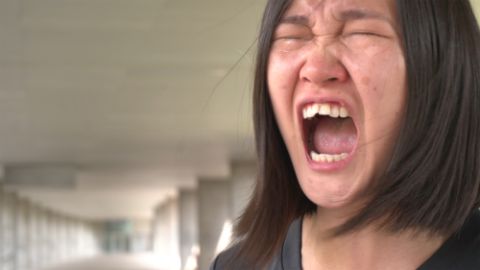Natalia Papaeva

Natalia Papaeva, Yokhor (2018), video still. Courtesy Natalia Papaeva
The survival of her native tongue and the frustration over its gradual loss are central themes of Natalia Papaeva’s practice. Hailing from Buryatia—the Indigenous land of the Buryat people in Southern Siberia—she creates performances and visual artworks that draw upon her personal memories and collective experiences. Papaeva’s practice uses language as a tool to investigate the consequences of colonialism, expressed through spoken and written language, re-enactment of phrases, as well as songs in the Buryat language. Echoing the lines of Agha Shahid Ali’s poem, which inspire the title of this exhibition, Papaeva’s performance Yokhor powerfully articulates the immediacy of erasure that occurs when a language disappears under enforced power structures. In an emotional crescendo, she sings and then angrily shouts two lines from a traditional Buryat song-dance called yokhor—the only two lines she remembers—clinging to the elusive words in an expression of sorrow but also resilience. In The river I grew up with, Papaeva delves into the landscape of her home village of Orlik and revisits foggy childhood memories and family lore in an extended interview with her mother. As they speak a mix of Buryat and Russian, she writes down Russian words in red and Buryat words in green. Creating a patchy verbal map reminiscent of a dissolving landscape, she makes a single family’s interaction a reflection of an entire culture in flux.
With the kind support of the Embassy of the Kingdom of the Netherlands in Germany.
Work in the exhibition:
Yokhor (2018), single-channel video performance, 11'. Cameraman: Oleg Revenko. Courtesy of the artist The river I grew up with (2023), single-channel video performance, 30'. Courtesy of the artist. Dramaturg: Koen Bartijn; Cameraman: Oleg Revenko